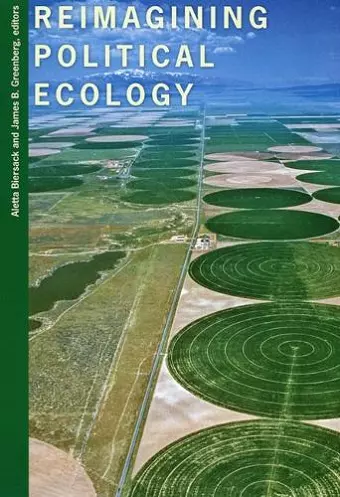Reimagining Political Ecology
James B Greenberg editor Aletta Biersack editor
Format:Paperback
Publisher:Duke University Press
Published:22nd Nov '06
Currently unavailable, and unfortunately no date known when it will be back

Introduces heterogeneity and paradox into our understanding of political ecology, critiquing 'modernist ecologies' and emphasizing transnational, place-based ones.
A collection of ethnographies grounded in second-generation political ecology, which focuses on the interchanges between nature and culture, and the local and the global.Reimagining Political Ecology is a state-of-the-art collection of ethnographies grounded in political ecology. When political ecology first emerged as a distinct field in the early 1970s, it was rooted in the neo-Marxism of world system theory. This collection showcases second-generation political ecology, which retains the Marxist interest in capitalism as a global structure but which is also heavily influenced by poststructuralism, feminism, practice theory, and cultural studies. As these essays illustrate, contemporary political ecology moves beyond binary thinking, focusing instead on the interchanges between nature and culture, the symbolic and the material, and the local and the global.
Aletta Biersack’s introduction takes stock of where political ecology has been, assesses the field’s strengths, and sets forth a bold research agenda for the future. Two essays offer wide-ranging critiques of modernist ecology, with its artificial dichotomy between nature and culture, faith in the scientific management of nature, and related tendency to dismiss local knowledge. The remaining eight essays are case studies of particular constructions and appropriations of nature and the complex politics that come into play regionally, nationally, and internationally when nature is brought within the human sphere. Written by some of the leading thinkers in environmental anthropology, these rich ethnographies are based in locales around the world: in Belize, Papua New Guinea, the Gulf of California, Iceland, Finland, the Peruvian Amazon, Malaysia, and Indonesia. Collectively, they demonstrate that political ecology speaks to concerns shared by geographers, sociologists, political scientists, historians, and anthropologists alike. And they model the kind of work that this volume identifies as the future of political ecology: place-based “ethnographies of nature” keenly attuned to the conjunctural effects of globalization.
Contributors. Eeva Berglund, Aletta Biersack, J. Peter Brosius, Michael R. Dove, James B. Greenberg, Søren Hvalkof, J. Stephen Lansing, Gísli Pálsson, Joel Robbins, Vernon L. Scarborough, John W. Schoenfelder, Richard Wilk
“Reimagining Political Ecology is an important contribution to efforts to build a more nuanced poststructural political ecology and a pertinent reminder that political ecology has benefited enormously from the work of anthropologists.”—Raymond Bryant, author of The Political Ecology of Forestry in Burma, 1824–1994
“Political ecologists have helped configure the fields of environmental governance and environmental justice. This thoughtful, insight-filled collection helps readers rethink some of the main concerns of political ecology. Organized in complementary counterpoint, the essays use evidence from around the world to make fundamental contributions toward a reconsideration of nature/culture relationships. Scholars from both disciplinary and interdisciplinary formations will discover the need to consult and use this volume.”—Arun Agrawal, author of Environmentality: Technologies of Government and the Making of Subjects
ISBN: 9780822336723
Dimensions: unknown
Weight: 649g
440 pages